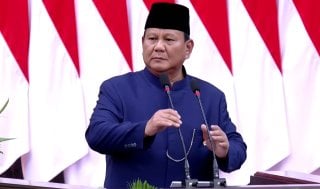Seizing the Moment in Indonesia Under Prabowo’s Leadership
As Prabowo assumes office, the United States has a unique window to solidify its relationship with Indonesia. Formalizing defense agreements and critical minerals partnerships, supporting energy transitions, and encouraging Indonesia’s role as a diplomatic leader in the Muslim world can establish a robust and enduring partnership.
As Southeast Asia’s largest economy and a pivotal state in the Indo-Pacific, Indonesia under the leadership of Prabowo Subianto presents unique opportunities for enhancing U.S. relations. With his extensive military training and education in the United States, Prabowo possesses an in-depth understanding of American strategy and diplomacy—positioning Indonesia as a critical partner in counterbalancing China’s growing influence and enhancing regional security.
Indonesia’s Strategic Value and Prabowo’s Unique Credentials
Indonesia’s strategic importance is multifaceted. It serves as a vital player in balancing economic partnerships with China while maintaining long-standing security ties with the United States. This dual role enables Indonesia to function as a “swing state,” offering a key partnership for the United States and its allies in Southeast Asia. Prabowo’s background is particularly advantageous for this partnership. Having trained at esteemed military facilities such as Fort Bragg and Fort Benning, he possesses a profound understanding of American strategic priorities. His tenure as Indonesia’s defense minister has been marked by strengthened collaboration with U.S. defense institutions, fostering joint military exercises and facilitating defense equipment acquisitions. Moreover, Prabowo’s cosmopolitan outlook, informed by his experiences abroad, allows him to effectively navigate international relations. His familiarity with U.S. policy provides a platform for renewed and deepened diplomatic and economic connections. Under his leadership, Indonesia can become an even more influential player in regional security discussions, thus aligning more closely with U.S. interests.
Opportunities for Enhanced Defense and Security Cooperation
A critical area for expanded cooperation lies in defense and security. The United States and Indonesia have the potential to deepen collaboration through enhanced military exercises, such as the annual Super Garuda Shield, and initiatives focused on joint cybersecurity efforts. These endeavors are particularly essential amid rising tensions in the South China Sea and the evolving security landscape of the Indo-Pacific. To capitalize on this opportunity, the United States must act swiftly to formalize these ties, providing targeted resources and expertise to strengthen Indonesia’s capacity as a stabilizing force in Southeast Asia. Such cooperation will help deter coercive actions from regional adversaries, contributing to a more secure Indo-Pacific environment. In addition, the United States can play a role in strengthening Indonesia’s counter-terrorism capabilities. Given the complex security challenges that Indonesia faces, including domestic terrorism and transnational crime, collaborative training programs and intelligence-sharing initiatives could enhance Indonesia’s effectiveness in combating these threats. This multifaceted approach to security cooperation not only reinforces bilateral ties but also ensures greater stability within the region.
Expanding Economic Ties in Critical Minerals and Renewable Energy
Indonesia is rich in natural resources, particularly nickel, which is vital for the U.S. electric vehicle (EV) supply chain. The vast reserves of this critical mineral present an opportunity for the United States to diversify its sourcing and reduce its dependency on China. A formalized U.S.-Indonesia critical minerals agreement could attract significant American investment, positioning Indonesia as a preferred supplier while promoting sustainable mining practices. Moreover, the Joint Energy Transition Partnership (JETP) offers a promising avenue for collaboration. By restructuring aspects of JETP to prioritize cleaner technologies for nickel smelting and bolstering investments in renewable energy projects, the United States can assist Indonesia in building a more sustainable and competitive economy. Such initiatives not only align with global climate goals but also strengthen economic ties between the two nations, fostering a partnership rooted in mutual benefits.
Indonesia’s Role in Promoting Stability in the Muslim World
As the world’s largest Muslim-majority democracy, Indonesia holds significant diplomatic clout in the Muslim world. Under Prabowo’s leadership, Indonesia could enhance its role as a stabilizing force in the Middle East, supporting the principles of the Abraham Accords and fostering dialogue between Muslim-majority nations and Israel. By positioning itself as a moderate voice, Indonesia can counteract divisive, extremist narratives and present a viable alternative to Iranian ideological hegemony. This diplomatic engagement would allow Indonesia to act as a broker for peace, fostering an interconnected and prosperous Muslim world aligned with U.S. interests. In this context, U.S. support for Indonesia’s leadership in regional diplomacy could not only strengthen bilateral relations but also contribute to a more stable global landscape.
A Strategic Partnership for the Future
As Prabowo assumes office, the United States has a unique window to solidify its relationship with Indonesia. Formalizing defense agreements and critical minerals partnerships, supporting energy transitions, and encouraging Indonesia’s role as a diplomatic leader in the Muslim world can establish a robust and enduring partnership. This strategic approach positions Indonesia as a cornerstone of U.S. Indo-Pacific strategy. Furthermore, enhancing people-to-people ties through educational exchanges and cultural initiatives can foster a deeper understanding between the two nations, promoting long-term collaboration. Engaging in joint research projects, especially in areas such as climate change, health, and technology, can create additional avenues for cooperation, enriching the bilateral relationship.
By capitalizing on these shared interests, the United States can gain a resilient partner in Southeast Asia’s dynamic landscape.
Together, Indonesia and the United States can navigate the complexities of the twenty-first century, ensuring a stable, secure, and prosperous future for both nations.
Ahmed Charai is the Publisher of the Jerusalem Strategic Tribune and serves on the boards of directors of the Atlantic Council, the International Crisis Group, the Center for Strategic and International Studies, the Foreign Policy Research Institute, and the Center for the National Interest.
Image: Bang Ricci / Shutterstock.com

